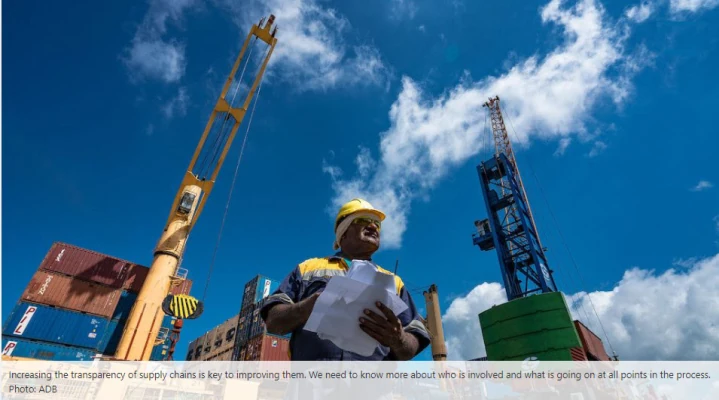Global Supply Chains Need Upgrading for a Green, Inclusive, Resilient and Socially Responsible Future
Trade digitalization needs to happen to transform trade and supply chains, but will need all participants in the trade eco-system – exporters, shippers, ports, customs, warehousing/logistics, and importers – to agree on the standards and protocols to underpin digitalization.
ADB Trade and Supply Chain Finance Program Head Steven Beck explained how the Digital Standards Initiative, set up by ADB, Government of Singapore and the International Chamber of Commerce, is working on this with all its stakeholders to bring trade and supply chains into the digital world.
-
Supply chains must help fight climate change ) More than 80% of greenhouse-gas emissions and more than 90% of the impact of the operations of consumer goods companies on air, land, water, biodiversity, and geological resources came from their supply chains(
-
Small supply chain companies are often unaware of standards
-
Supply chains as a vehicle for change on key issues ) We need to highlight the importance of trade and supply chains as a vehicle for substantive change for the environment(
Trade and supply chains can be tools to combat the challenges of the future, but they first need to be made more transparent, robust and resilient.
KEY TAKEAWAYS:
-
The COVID-19 pandemic highlighted the fragility of global trade and supply chains.
-
Supply chains must become more resilient, but they also need to be adapted to help with issues such as climate change, unfair labor practices and gender inequality.
-
That change must start with making trade and supply chains digital so that they can be measured and monitored.
More information:
https://www.adb.org/news/features/global-supply-chains-need-upgrading-green-inclusive-resilient-socially-responsible-future?_cldee=D-bCJG9P0a74w3dagax8HqAcnwH36SOT_zDOEH7Is_uOWoxsz0Ym2Bxt3Khcr7sj&recipientid=contact-19b60dc61578ea11a811000d3aba77ea-a263117f577c40d7a7bd929c7fa740d6&esid=ac25cea2-e21d-ed11-b83d-000d3a654841
